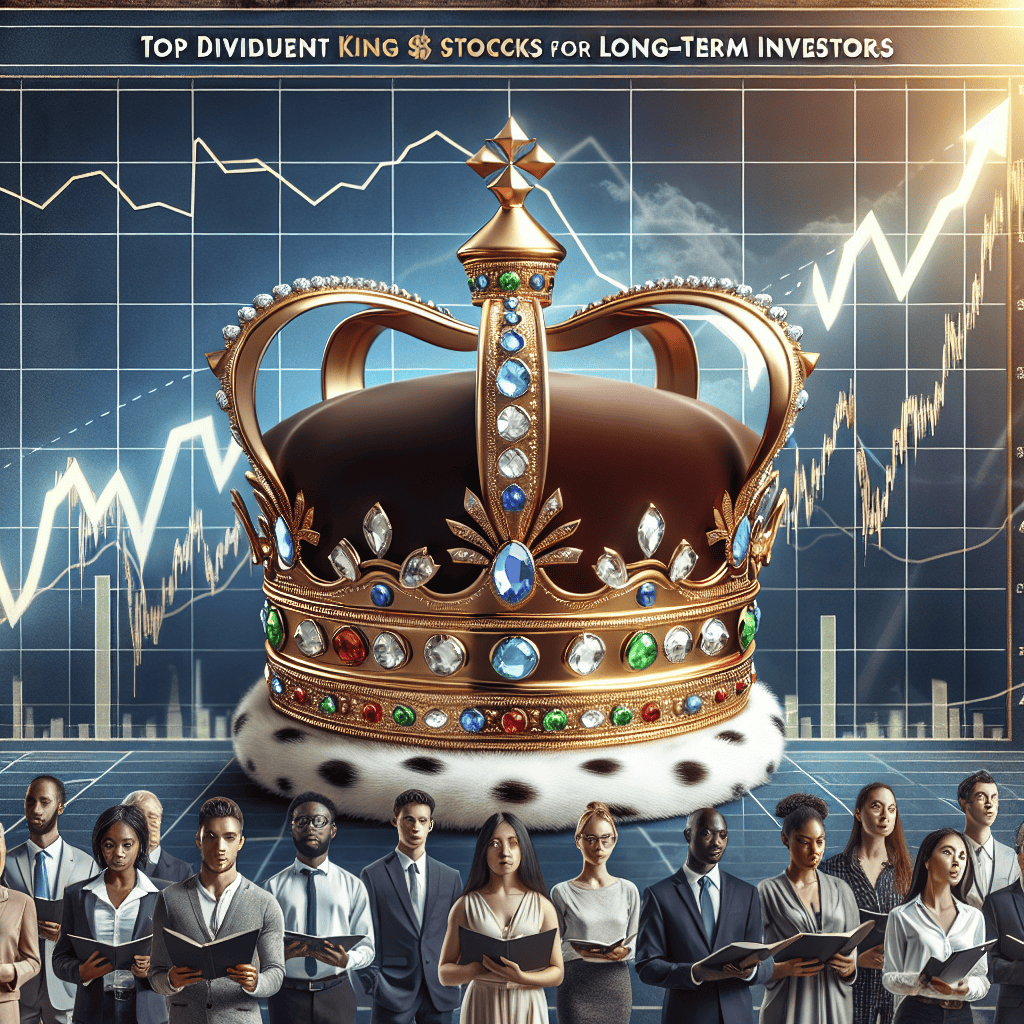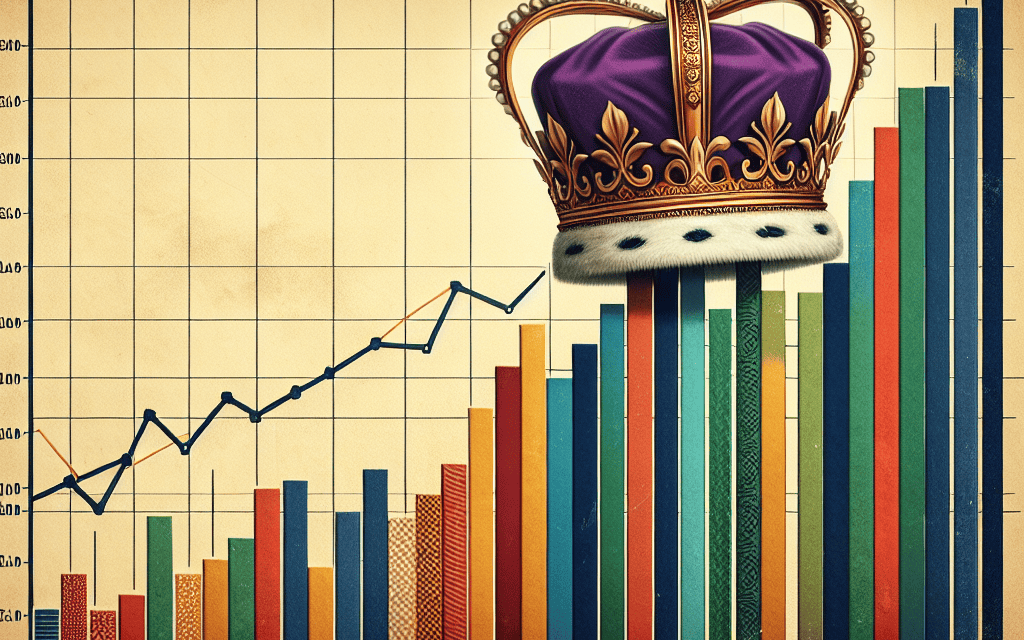“Reign in Returns: Top Dividend King Stocks for Long-Term Wealth Building”
Introduction
Investing in dividend king stocks is a time-tested strategy for long-term investors seeking stability and consistent income. Dividend kings are a select group of companies that have demonstrated remarkable resilience and financial strength by increasing their dividend payouts for at least 50 consecutive years. These companies typically operate in mature industries with stable cash flows, making them attractive options for those looking to build a reliable income stream while also benefiting from potential capital appreciation. By focusing on dividend kings, investors can gain exposure to some of the most established and well-managed companies in the market, which have proven their ability to navigate economic cycles and deliver shareholder value over the long haul.
Overview Of Dividend Kings: What Makes Them Unique For Long-Term Investors
Dividend Kings represent a prestigious group of companies that have consistently demonstrated their ability to reward shareholders through dividends for an extended period. Specifically, these are companies that have increased their dividend payouts for at least 50 consecutive years. This remarkable achievement not only highlights their financial stability but also underscores their commitment to returning value to shareholders. For long-term investors, Dividend Kings offer a unique blend of reliability and growth potential, making them an attractive option for those seeking steady income and capital appreciation over time.
One of the key attributes that make Dividend Kings unique is their resilience in various economic climates. These companies have weathered numerous market cycles, including recessions, inflationary periods, and geopolitical uncertainties, yet they have managed to maintain and even increase their dividend payouts. This resilience is often a testament to their strong business models, competitive advantages, and prudent management practices. As a result, investors can have a higher degree of confidence in the sustainability of their dividends, which is a crucial consideration for those relying on dividend income for retirement or other long-term financial goals.
Moreover, Dividend Kings typically operate in mature industries with established market positions. This maturity often translates into stable cash flows, which are essential for supporting regular dividend payments. Industries such as consumer staples, healthcare, and utilities are well-represented among Dividend Kings, as these sectors tend to have consistent demand regardless of economic conditions. For instance, companies like Procter & Gamble and Johnson & Johnson have long been staples in the Dividend Kings list, thanks to their ability to generate reliable revenue streams from essential products and services.
In addition to their stability, Dividend Kings also offer the potential for capital appreciation. While these companies may not exhibit the rapid growth seen in younger, high-growth sectors, their steady performance and ability to reinvest in their businesses can lead to gradual increases in stock prices over time. This combination of dividend income and potential capital gains can be particularly appealing to long-term investors who prioritize a balanced approach to wealth accumulation.
Furthermore, the disciplined approach required to achieve and maintain Dividend King status often reflects a company’s strong corporate governance and shareholder-friendly policies. These companies are typically characterized by transparent financial reporting, prudent capital allocation, and a focus on long-term value creation. Such attributes can provide investors with additional peace of mind, knowing that their interests are aligned with those of the company’s management and board of directors.
While investing in Dividend Kings offers numerous advantages, it is important for investors to conduct thorough due diligence before making investment decisions. Factors such as the company’s payout ratio, debt levels, and growth prospects should be carefully evaluated to ensure that the dividend is sustainable and that the company is well-positioned for future success. Additionally, diversification across different sectors and geographies can help mitigate risks associated with individual companies or industries.
In conclusion, Dividend Kings represent a compelling option for long-term investors seeking a combination of income stability and growth potential. Their proven track record of dividend increases, resilience in various economic environments, and strong corporate governance make them a unique and attractive choice for those looking to build a robust investment portfolio. By carefully selecting and diversifying among these elite companies, investors can enhance their chances of achieving their long-term financial objectives.
Analyzing The Performance Of Top Dividend King Stocks Over The Last Decade
Over the past decade, the performance of top Dividend King stocks has been a subject of keen interest for long-term investors seeking stable and reliable returns. Dividend Kings, a prestigious group of companies that have consistently increased their dividends for at least 50 consecutive years, represent a beacon of financial stability and resilience. As we delve into the performance of these stocks, it is essential to consider both their historical returns and the factors contributing to their sustained success.
To begin with, the consistent dividend growth exhibited by Dividend Kings is a testament to their robust business models and strong financial health. Companies such as Procter & Gamble, Johnson & Johnson, and Coca-Cola have demonstrated an unwavering commitment to returning value to shareholders, even during periods of economic uncertainty. This reliability is particularly appealing to long-term investors who prioritize income stability over short-term capital gains. Over the last decade, these companies have not only maintained but also increased their dividend payouts, providing a steady income stream that can be reinvested to compound returns over time.
Moreover, the resilience of Dividend King stocks during market downturns further underscores their appeal. During the financial crisis of 2008 and the more recent market volatility induced by the COVID-19 pandemic, these companies showcased their ability to weather economic storms. Their diversified revenue streams, strong balance sheets, and prudent management practices have enabled them to sustain operations and continue rewarding shareholders, even in challenging times. This resilience is a critical factor that has contributed to their long-term outperformance relative to the broader market.
In addition to their defensive characteristics, Dividend Kings have also benefited from favorable macroeconomic trends over the past decade. The low-interest-rate environment, for instance, has made dividend-paying stocks more attractive to income-seeking investors, driving demand and supporting share price appreciation. Furthermore, the global expansion of middle-class consumers has bolstered demand for the products and services offered by many Dividend Kings, particularly those in the consumer staples and healthcare sectors. This growth in demand has translated into increased revenues and, consequently, higher dividends.
However, it is important to acknowledge that not all Dividend Kings have performed equally well. While some have thrived, others have faced challenges that have impacted their returns. For instance, companies in the industrial and energy sectors have encountered headwinds due to fluctuating commodity prices and shifting regulatory landscapes. As a result, investors must conduct thorough due diligence and consider sector-specific risks when selecting Dividend King stocks for their portfolios.
In conclusion, the performance of top Dividend King stocks over the last decade highlights their enduring appeal to long-term investors. Their consistent dividend growth, resilience during economic downturns, and alignment with favorable macroeconomic trends have contributed to their sustained success. Nevertheless, investors should remain vigilant and consider individual company fundamentals and sector dynamics when making investment decisions. By doing so, they can harness the benefits of Dividend King stocks while mitigating potential risks, ultimately achieving a balanced and rewarding investment strategy.
How To Identify The Best Dividend King Stocks For Your Portfolio
When considering the addition of dividend king stocks to your investment portfolio, it is essential to understand the characteristics that make these stocks a valuable choice for long-term investors. Dividend kings are companies that have consistently increased their dividend payouts for at least 50 consecutive years. This remarkable achievement not only demonstrates a company’s ability to generate stable and growing cash flows but also reflects its commitment to returning value to shareholders. To identify the best dividend king stocks for your portfolio, several key factors should be taken into account.
First and foremost, it is crucial to evaluate the financial health of the company. A strong balance sheet, characterized by manageable levels of debt and ample liquidity, is indicative of a company’s ability to sustain and grow its dividend payments. Companies with solid financial foundations are better equipped to weather economic downturns and continue rewarding their shareholders. Additionally, examining the company’s cash flow statements can provide insights into its ability to generate sufficient cash to cover dividend payments. Consistent and robust cash flow is a positive indicator of a company’s operational efficiency and financial stability.
Moreover, assessing the company’s dividend payout ratio is another important step in identifying top dividend king stocks. The payout ratio, which is the proportion of earnings paid out as dividends, can reveal whether a company’s dividend payments are sustainable. A lower payout ratio suggests that the company retains a significant portion of its earnings for reinvestment or to cushion against future uncertainties, thereby enhancing its ability to maintain or increase dividends over time. Conversely, a high payout ratio may indicate that the company is distributing a large portion of its earnings, potentially limiting its capacity to sustain dividend growth in challenging times.
In addition to financial metrics, it is beneficial to consider the company’s competitive position within its industry. Companies with strong competitive advantages, such as brand recognition, proprietary technology, or cost leadership, are more likely to maintain their market position and profitability over the long term. These competitive advantages can provide a buffer against market volatility and support the company’s ability to continue paying dividends. Furthermore, understanding the industry dynamics and growth prospects can help investors gauge the potential for future dividend increases.
Another critical aspect to consider is the company’s historical performance and management’s track record. A history of consistent dividend increases is a testament to the company’s resilience and management’s commitment to shareholder returns. Evaluating management’s strategic vision and execution capabilities can provide additional confidence in the company’s ability to sustain its dividend growth trajectory. Companies with experienced and shareholder-focused management teams are often better positioned to navigate challenges and capitalize on growth opportunities.
Finally, diversification is a prudent strategy when selecting dividend king stocks for your portfolio. By investing in a diverse range of companies across different sectors, investors can mitigate risks associated with individual stocks or industries. Diversification can enhance the stability of dividend income and reduce the impact of sector-specific downturns on the overall portfolio.
In conclusion, identifying the best dividend king stocks for your portfolio involves a comprehensive analysis of financial health, dividend sustainability, competitive positioning, historical performance, and diversification. By carefully considering these factors, long-term investors can build a robust portfolio of dividend king stocks that not only provide reliable income but also offer the potential for capital appreciation over time.
The Role Of Dividend Kings In A Diversified Investment Strategy

In the realm of investment strategies, diversification remains a cornerstone principle, offering a buffer against market volatility and enhancing potential returns. Within this framework, Dividend Kings hold a unique and esteemed position. These are companies that have not only paid but also increased their dividends for at least 50 consecutive years. Their consistent performance and resilience make them an attractive option for long-term investors seeking stability and growth. As we delve into the role of Dividend Kings in a diversified investment strategy, it becomes evident that their inclusion can significantly bolster an investor’s portfolio.
To begin with, Dividend Kings are often characterized by their robust business models and strong financial health. These companies have weathered various economic cycles, demonstrating their ability to generate steady cash flows even in challenging times. This resilience is crucial for long-term investors who aim to minimize risk while maximizing returns. By incorporating Dividend Kings into a diversified portfolio, investors can benefit from a reliable income stream, which can be particularly advantageous during periods of market downturns when capital appreciation may be limited.
Moreover, the presence of Dividend Kings in a portfolio can enhance its overall stability. These companies typically operate in mature industries with established market positions, which often translates to lower volatility compared to high-growth stocks. This stability is further reinforced by their commitment to returning capital to shareholders through dividends. As a result, investors can enjoy a degree of predictability in their returns, which is a valuable attribute in an ever-changing market landscape.
In addition to providing stability, Dividend Kings can also contribute to the growth potential of a diversified investment strategy. While their primary appeal lies in their dividend payouts, many of these companies also offer opportunities for capital appreciation. Over time, the reinvestment of dividends can lead to compounding returns, significantly enhancing the overall value of an investment. This dual benefit of income and growth makes Dividend Kings a compelling choice for investors with a long-term horizon.
Furthermore, the inclusion of Dividend Kings in a diversified portfolio can serve as a hedge against inflation. As the cost of living rises, the purchasing power of fixed income streams can erode. However, companies that consistently increase their dividends can help mitigate this risk by providing a growing income stream that keeps pace with or even outpaces inflation. This characteristic is particularly appealing to retirees or those nearing retirement, who rely on their investment income to maintain their standard of living.
It is also worth noting that Dividend Kings often exhibit strong corporate governance and a shareholder-friendly approach. Their long history of dividend increases reflects a commitment to rewarding shareholders, which can be indicative of prudent management practices. This focus on shareholder value can instill confidence in investors, knowing that their interests are aligned with those of the company’s leadership.
In conclusion, Dividend Kings play a vital role in a diversified investment strategy by offering a blend of stability, income, and growth potential. Their ability to withstand economic fluctuations, coupled with their commitment to returning capital to shareholders, makes them an attractive option for long-term investors. By incorporating these stalwarts into a diversified portfolio, investors can achieve a balanced approach that not only seeks to preserve capital but also aims to generate sustainable returns over time.
Comparing Dividend Kings With Other Dividend Growth Stocks
When considering investment strategies for long-term growth, dividend stocks often emerge as a compelling option. Among these, Dividend Kings hold a special place due to their remarkable track record of increasing dividends for at least 50 consecutive years. This achievement not only signifies financial stability but also reflects a company’s commitment to returning value to shareholders. However, to fully appreciate the allure of Dividend Kings, it is essential to compare them with other dividend growth stocks, which also offer potential benefits for investors.
Dividend growth stocks, in general, are companies that have consistently increased their dividend payouts over time. These stocks are attractive because they provide a steady income stream and the potential for capital appreciation. However, not all dividend growth stocks are created equal. While some companies may have a history of increasing dividends for a decade or two, Dividend Kings have demonstrated an unparalleled ability to sustain and grow their payouts over half a century. This distinction underscores their resilience and adaptability in various economic climates.
One of the primary advantages of investing in Dividend Kings is their proven track record of weathering economic downturns. These companies have survived multiple recessions, market crashes, and industry disruptions, yet they have continued to reward their shareholders with increasing dividends. This resilience is often attributed to their strong business models, diversified revenue streams, and prudent management practices. In contrast, other dividend growth stocks may not have the same level of experience or stability, making them potentially more vulnerable during economic turbulence.
Moreover, Dividend Kings often belong to well-established industries such as consumer goods, healthcare, and utilities. These sectors are typically characterized by steady demand and less susceptibility to economic cycles, providing a reliable foundation for sustained dividend growth. On the other hand, some dividend growth stocks may be part of more volatile industries, where market dynamics can significantly impact their ability to maintain or increase dividends. Therefore, for risk-averse investors seeking long-term stability, Dividend Kings may offer a more appealing option.
However, it is important to note that the exclusivity and stability of Dividend Kings often come with a trade-off in terms of growth potential. These companies are usually mature, with limited opportunities for rapid expansion compared to younger, more dynamic firms. Consequently, while Dividend Kings provide a reliable income stream, their capital appreciation potential may be lower than that of other dividend growth stocks, which might be in earlier stages of growth and capable of delivering higher returns.
In addition, the valuation of Dividend Kings can sometimes be a concern. Due to their reputation and reliability, these stocks often trade at a premium, which can limit the potential for significant price appreciation. Investors must carefully assess whether the premium is justified by the stability and income potential offered by these companies. In contrast, other dividend growth stocks might be available at more attractive valuations, offering a balance between income and growth.
In conclusion, while both Dividend Kings and other dividend growth stocks present viable options for long-term investors, the choice ultimately depends on individual investment goals and risk tolerance. Dividend Kings offer unparalleled stability and a proven track record, making them ideal for those prioritizing income and security. Meanwhile, other dividend growth stocks may provide higher growth potential, appealing to investors willing to embrace a bit more risk for the possibility of greater returns. By understanding these distinctions, investors can make informed decisions that align with their financial objectives.
The Impact Of Economic Cycles On Dividend King Stocks
Dividend King stocks, known for their impressive track record of increasing dividends for at least 50 consecutive years, are often considered a safe haven for long-term investors. These stocks, typically representing well-established companies with robust business models, have demonstrated resilience through various economic cycles. Understanding the impact of these cycles on Dividend King stocks is crucial for investors seeking stability and growth in their portfolios.
Economic cycles, characterized by periods of expansion and contraction, significantly influence the performance of Dividend King stocks. During periods of economic expansion, companies generally experience increased revenues and profits, which can lead to higher dividend payouts. For Dividend Kings, this often means not only maintaining their dividend streak but also potentially increasing the dividend amount. This ability to consistently raise dividends during prosperous times underscores the financial health and operational efficiency of these companies.
Conversely, during economic downturns, many companies face challenges such as reduced consumer spending, tighter credit conditions, and declining profits. However, Dividend King stocks often exhibit remarkable resilience during these periods. Their long-standing history of dividend increases is a testament to their ability to navigate economic adversities. These companies typically have strong balance sheets, diversified revenue streams, and prudent management practices that enable them to weather economic storms without compromising their dividend policies.
Moreover, the defensive nature of many Dividend King stocks further enhances their appeal during economic contractions. Companies in sectors such as consumer staples, healthcare, and utilities, which are well-represented among Dividend Kings, tend to have stable demand regardless of economic conditions. This stability provides a buffer against economic volatility, allowing these companies to maintain their dividend commitments even when the broader market faces headwinds.
In addition to their defensive characteristics, Dividend King stocks often benefit from a flight-to-quality phenomenon during economic downturns. Investors, seeking refuge from market volatility, tend to gravitate towards high-quality, dividend-paying stocks. This increased demand can help support the stock prices of Dividend Kings, mitigating the impact of broader market declines. Consequently, these stocks can offer a degree of capital preservation alongside their income-generating potential.
Furthermore, the impact of economic cycles on Dividend King stocks is not limited to their financial performance. These cycles also influence investor sentiment and market perceptions. During periods of economic uncertainty, the reliability and predictability of dividend payments become particularly attractive to investors. This can lead to a re-rating of Dividend King stocks, as their perceived value increases relative to other investment options. As a result, these stocks may experience less volatility compared to the broader market, providing a smoother investment journey for long-term investors.
In conclusion, the impact of economic cycles on Dividend King stocks is multifaceted, affecting their financial performance, investor sentiment, and market dynamics. While economic expansions provide opportunities for growth and increased dividends, downturns highlight the resilience and defensive qualities of these stocks. For long-term investors, understanding these dynamics is essential for making informed investment decisions. By recognizing the strengths of Dividend King stocks across different economic environments, investors can better position themselves to achieve their financial goals while navigating the inevitable ups and downs of the economic landscape.
Future Prospects: Are Dividend Kings Still A Safe Bet For Long-Term Investors?
Dividend Kings, a prestigious group of companies that have consistently increased their dividends for at least 50 consecutive years, have long been considered a safe haven for long-term investors. These companies, often characterized by their robust business models and resilient cash flows, have weathered various economic cycles, providing a sense of stability and reliability. However, as the global economic landscape continues to evolve, investors are increasingly questioning whether these stalwarts remain a safe bet for the future.
To begin with, the historical performance of Dividend Kings has been impressive, often outpacing broader market indices in terms of total return. This is largely due to their ability to generate consistent income through dividends, which can be reinvested to compound returns over time. Moreover, their commitment to returning capital to shareholders reflects a strong financial foundation and disciplined management practices. Nevertheless, past performance is not always indicative of future results, and investors must consider the changing dynamics that could impact these companies moving forward.
One of the primary factors influencing the future prospects of Dividend Kings is the macroeconomic environment. With interest rates at historically low levels, income-seeking investors have flocked to dividend-paying stocks, driving up valuations. While this has benefited existing shareholders, it raises concerns about the sustainability of such high valuations, especially if interest rates begin to rise. In such a scenario, the relative attractiveness of dividend stocks could diminish, potentially leading to price corrections.
Furthermore, the ongoing shift towards a more digital and sustainable economy presents both challenges and opportunities for Dividend Kings. Many of these companies operate in traditional industries such as consumer goods, utilities, and industrials, which may face disruption from technological advancements and changing consumer preferences. To remain competitive, these companies must adapt by investing in innovation and sustainability initiatives. Those that successfully navigate this transition could continue to thrive, while others may struggle to maintain their dividend growth streaks.
In addition to these external factors, investors should also consider the internal dynamics of Dividend Kings. Companies with strong balance sheets, low debt levels, and a history of prudent capital allocation are better positioned to withstand economic downturns and invest in future growth opportunities. Conversely, those with weaker financials may be forced to cut dividends or curtail growth initiatives, undermining their appeal to long-term investors.
Despite these challenges, Dividend Kings still offer several compelling advantages for long-term investors. Their track record of dividend growth provides a measure of predictability and income stability, which can be particularly valuable in uncertain times. Moreover, their focus on shareholder returns often aligns with a conservative management approach, prioritizing long-term value creation over short-term gains. This can result in a more disciplined approach to capital allocation, reducing the risk of overexpansion or ill-advised acquisitions.
In conclusion, while Dividend Kings face a range of challenges in the current economic climate, they remain a viable option for long-term investors seeking stability and income. By carefully evaluating each company’s financial health, growth prospects, and adaptability to changing market conditions, investors can identify those best positioned to continue their dividend growth streaks. As with any investment, diversification and a thorough understanding of individual company dynamics are crucial to mitigating risks and maximizing returns. Thus, while the future may hold uncertainties, Dividend Kings can still play a valuable role in a well-rounded investment portfolio.
Q&A
1. **What is a Dividend King?**
A Dividend King is a company that has consistently increased its dividend payout to shareholders for at least 50 consecutive years.
2. **Why are Dividend Kings attractive to long-term investors?**
Dividend Kings are attractive because they demonstrate financial stability, consistent earnings, and a commitment to returning capital to shareholders, making them reliable for long-term income.
3. **Name a well-known Dividend King.**
Procter & Gamble (PG) is a well-known Dividend King, having increased its dividend for over 60 years.
4. **What sector do many Dividend Kings belong to?**
Many Dividend Kings belong to the consumer staples sector, which includes companies that produce essential goods.
5. **How does inflation impact Dividend Kings?**
Dividend Kings often have pricing power and can pass on costs to consumers, helping them maintain profitability during inflationary periods.
6. **What is a potential risk of investing in Dividend Kings?**
A potential risk is that some Dividend Kings may have slower growth prospects compared to newer companies, as they are often mature businesses.
7. **How can Dividend Kings contribute to a diversified portfolio?**
Dividend Kings can provide stability and income, balancing out more volatile or growth-oriented investments in a diversified portfolio.
Conclusion
Top Dividend King stocks, which are companies that have consistently increased their dividends for at least 50 consecutive years, represent a compelling option for long-term investors seeking stability and reliable income. These stocks typically belong to well-established companies with strong financial health, robust cash flows, and a proven track record of weathering economic cycles. Investing in Dividend Kings can provide a hedge against market volatility and inflation, as these companies often have the resilience to maintain and grow dividends even during challenging times. Additionally, the compounding effect of reinvested dividends can significantly enhance total returns over the long term. However, investors should conduct thorough research and consider diversification, as past performance does not guarantee future results, and individual company risks can still impact returns. Overall, Dividend Kings can be a valuable component of a diversified investment portfolio, offering both income and potential capital appreciation.





